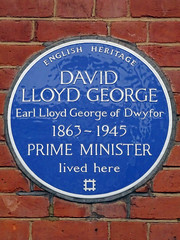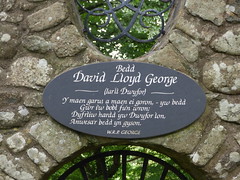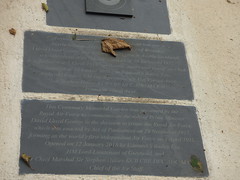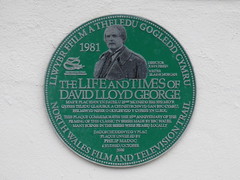Rt Hon. Earl Viscount David Lloyd George OM PC


Rt Hon. Earl Viscount David Lloyd George OM PC
(1863-1945)
solicitor (from 1884), Member of Parliament (1890-1944), Privy Counsellor (from 1905), Chancellor of the Exchequer (1908-1915), 52nd Prime Minister of the United Kingdom (1916-1922), Order of Merit recipient (from 1919), 1st Earl Lloyd George of Dwyfor (from 1945), and 1st Viscount Gwynedd (from 1945)
Commemorated on 5 plaques
David Lloyd George Earl Lloyd George of Dwyfor 1863-1945 Prime Minister lived here
3 Routh Road, Wandsworth Common, SW18 Wandsworth, London, United Kingdom where they lived
David Lloyd George [full inscription unknown]
Lloyd George Mansions, 191 Trinity Road, SW18, London, United Kingdom where they was
Bedd David Lloyd George ~ (Iarll Dwyfor) ~ Y maen garw, a maen ei goron, yw bedd Gwr i'w bodl fu'n wron; Dyfrliw hardd yw Dwyfor lon, Anwesa'r bedd yn gyson. W.R.P. George
English translation: Bedd David Lloyd George ~ (Earl of Dwyfor) ~ The grave is the rough mound and its crown She was a womb; Dwyfor lon is a beautiful watercolor, Angry the grave constantly. W.R.P. George
Grave of David Lloyd George near the Afon Dwyfor, Llanystumdwy, United Kingdom where they was buried (1945)
This Centenary Memorial Garden was presented by the Royal Air Force to commemorate the role of Prime Minister David Lloyd George in the decision to create the Royal Air Force, which was enacted by Act of Parliament on 29 November 1917, forming as the world's first independent Air Force on 1 April 1918. Opened on 12 January 2018 by Edmund S Bailey Esq. HM Lord-Lieutenant of Gwynedd and Chief Marshal Sir Stephen Hillier KCB CBE DFC ADC MA Chief of the Air Staff. [full inscription unknown]
Between the Lloyd George Museum and Highgate (childhood home of David Lloyd George), Llanystumdwy, United Kingdom where they was
1981 Director John Hefin Writer Elaine Morgan The Life and Times of David Lloyd George Mae'r plac hywn yn dathlu 25an Mlynedd ers ffilmio'r gyfres teledu glasurol a chynhyrchwyd gan BBC Cymru. Ffilmiwyd nifer o olygfeydd y gyfres yn lleol This plaque commemorates the 25th Anniversary of the filming of this classic TV series made by BBC Wales, many scenes in the series were filmed locally Dadorchuddiwydd y plac Plaque unveiled by Philip Madoc 6 Hydred / October 2006
English translation: 1981 Director John Hefin Writer Elaine Morgan The Life and Times of David Lloyd George This plaque commemorates the 25th Anniversary of the filming of this classic TV series made by BBC Wales, many scenes in the series were filmed locally Plaque unveiled by Philip Madoc 6 October 2006
Lloyd George Museum, Llanystumdwy, United Kingdom where they lived





